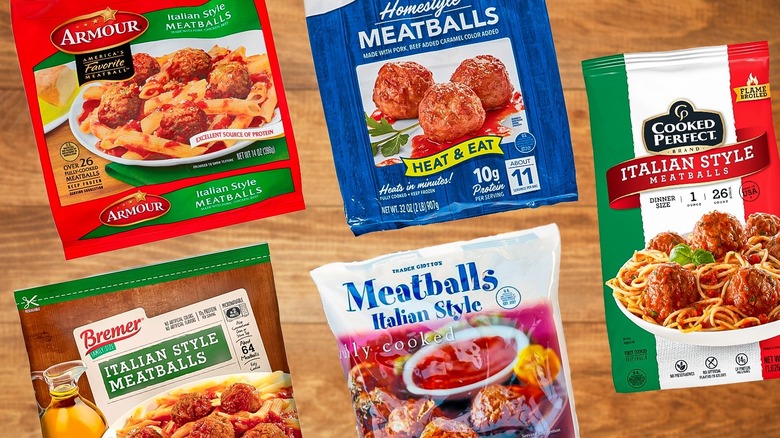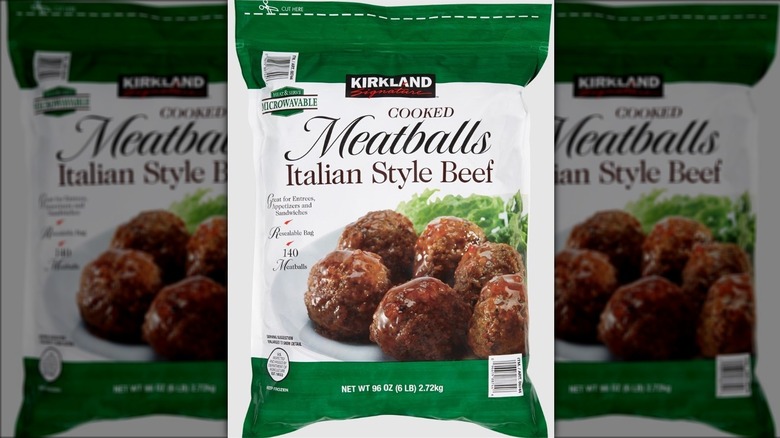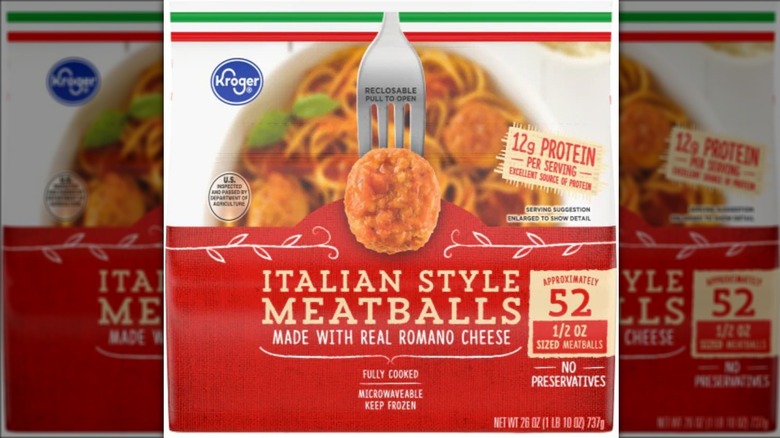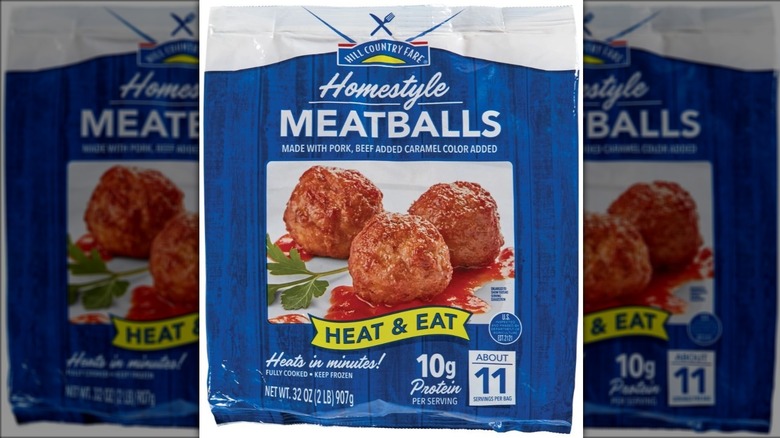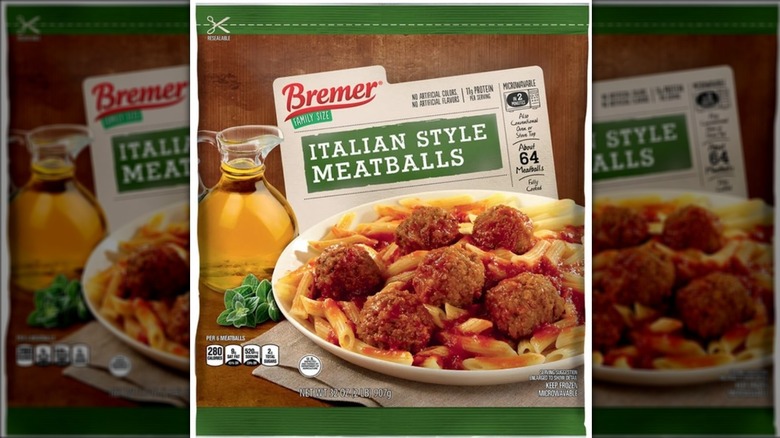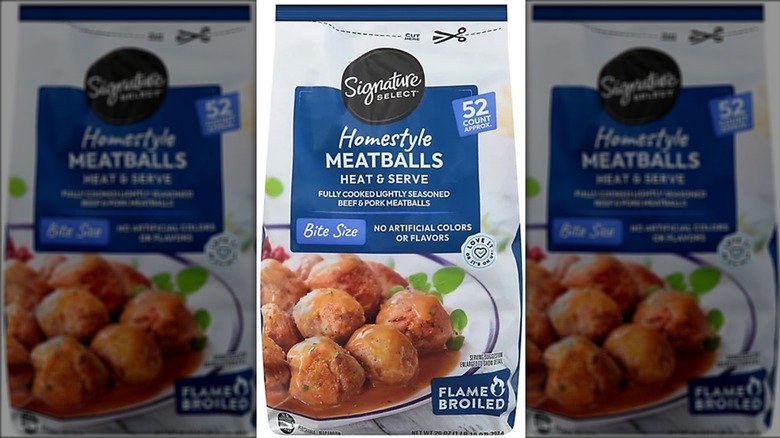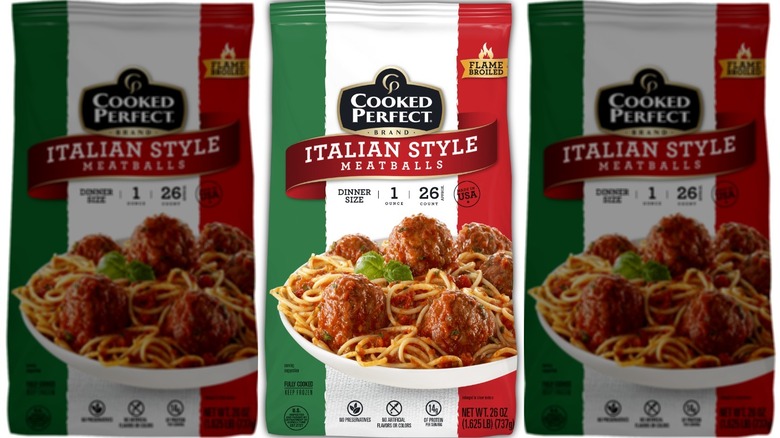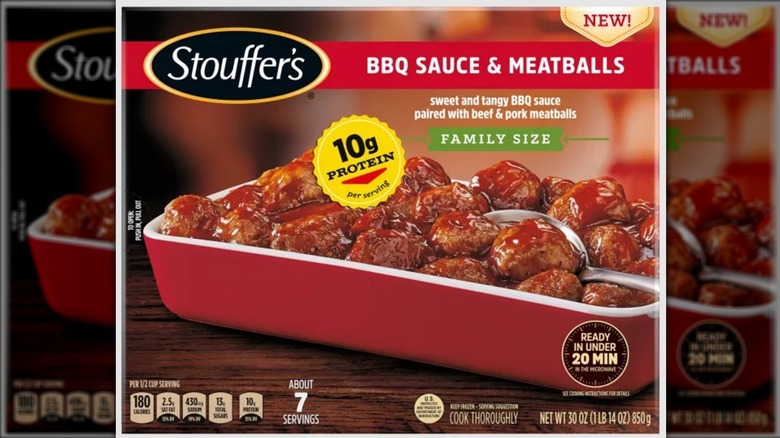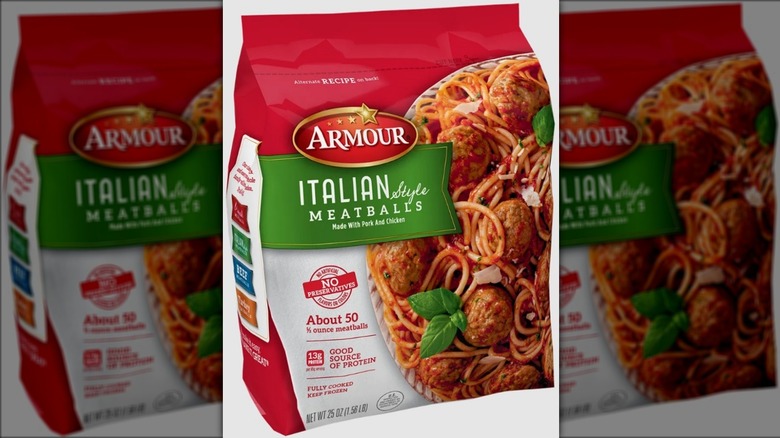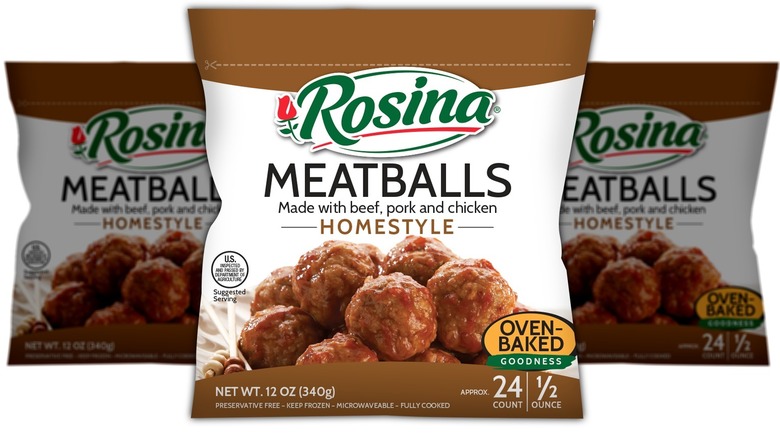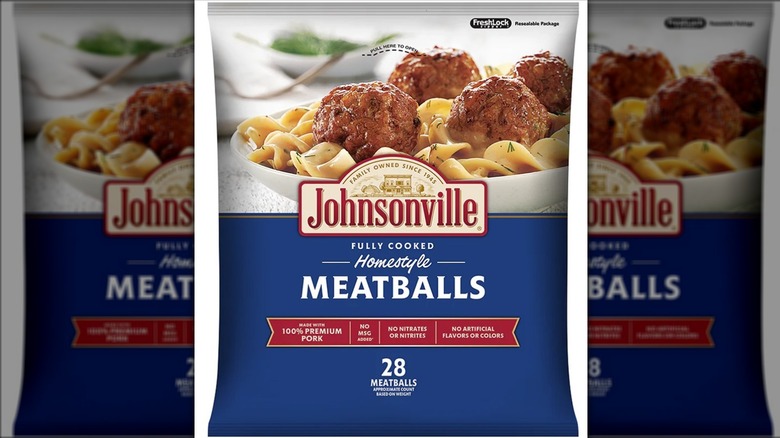The Unhealthiest Pre-Packaged Frozen Meatballs You Can Buy
Frozen meatballs can help save time in the kitchen, but like plenty of other pre-cooked items in the freezer aisle, some of the most widely available options don't make for altogether healthy choices. Since cooking a meatball recipe from scratch can be a laborious process, buying them pre-packaged and frozen is a sensible way to, say, streamline a spaghetti and meatball night for the whole family. There's reason, then, for even frozen food aisle skeptics to purchase meatballs frozen from time to time.
Of course, some of the unhealthiest frozen meatball brands may taste great and could be a preferred choice of a home chef simply looking for a tasty option. This list, rather, is based solely on nutritional content, without taking into account how any of these frozen meatballs may taste. So, anyone interested in the healthfulness of their meatball dinner might want to at least take note of the following products, each of which is among the unhealthiest pre-packaged, frozen meatballs available in major grocery stores.
Kirkland Signature Italian Style Beef Meatballs
As aficionados of the warehouse chain are well aware, Kirkland Signature is Costco's house brand. While it's possible that individual Costco stores may stock additional types of frozen meatballs depending on local availability, the sole frozen meatball option proprietary to the chain is Kirkland Signature's Italian Style Beef Meatballs. They come standard in a Costco-sized 6-pound bag.
A single, 90-gram serving of roughly five Kirkland Signature Italian Style Beef Meatballs contains 230 calories, 18 grams of fat, 1 gram of which is trans fat, 45 milligrams of cholesterol, 520 milligrams of sodium, 5 grams of carbs, and 1 gram of sugar. Those five meatballs, then, might not necessarily contribute a surplus of calories to a meal, but they do account for 23% of the daily recommended doses of both fat and sodium.
Perhaps more notably, that single gram of trans fat stands out given that academic outlets like Harvard Health Publishing consider trans fats devoid of nutritional value and technically unsafe to consume. Coupled with the fact that the bulk size of Kirkland Signature's bag of meatballs might encourage larger individual portions, Costco's proprietary option can be considered one of the unhealthiest frozen meatball brands on the market.
Kroger Fully Cooked Microwaveable Italian Style Frozen Meatballs
The Kroger brand is something used at stores that fall under the Kroger umbrella, which includes not just Kroger grocery shops but also Fred Meyer, Ralphs, Smith's Food and Drug, and others. Of the different kinds of frozen meatballs sold in the chain's generic packaging, Kroger's Italian Style Meatballs are the least healthy. One 85-gram serving of about six meatballs totals 250 calories, 20 grams of fat, 0.5 grams of which are trans fat, 50 milligrams of cholesterol, 570 milligrams of sodium, 7 grams of carbs, and 1 gram of sugar.
First and foremost, that half gram of trans fat is undesirable in and of itself. While that amount may be just half of what's included in a serving of Kirkland Signature frozen meatballs, Kroger's Italian Style option is also comparatively higher in calories, fat, sodium, cholesterol, and carbs — virtually every notable metric. Simply put, a serving of sodium equivalent to 25% of the FDA's daily recommended value in what's likely just one component of a more complex dinner is excessive. Health-conscious home chefs may therefore want to avoid this product.
Trader Joe's Italian Style Meatballs
Trader Joe's sells three kinds of meatballs, one of which is made with chicken and one of which is comprised of a vegetarian-friendly meat alternative. It's unsurprisingly the sole beef-based option, which the chain brands as Italian Style Meatballs, that lands on this list. These particular Trader Joe's frozen meatballs are large — one 71-gram serving is equivalent to just two meatballs. Together, they account for 240 calories, 20 grams of fat, 1 gram of which is trans fat, 65 milligrams of cholesterol, 450 milligrams of sodium, 5 grams of carbs, and 2 grams of sugar.
What stands out most are that gram of trans fat and the 65 milligrams of cholesterol. Plus, that two-meatball serving is estimated to weigh 71 grams, which is significantly less than the 85-gram serving that's relatively standard for frozen meatballs. Nevertheless, that serving is higher in cholesterol than what's in plenty of competitors' products in spite of its smaller size. It's the cholesterol-averse, then, that might want to be most wary of Trader Joe's Italian Style Meatballs.
Hill Country Fare Homestyle Meatballs
While H-E-B is a regional business, with stores located exclusively in Texas and Mexico, its footprint consists of more than 400 individual locations, serving a significant cross section of the sizable Texas population. H-E-B supermarkets carry products packaged in multiple private labels, including a generic H-E-B brand. However, it's the Hill Country Fare Homestyle Meatballs that stand out as the unhealthiest of all frozen meatball options proprietary to the H-E-B chain.
One 85-gram serving of approximately six meatballs contains 360 calories, 33 grams of fat, 45 milligrams of cholesterol, 500 milligrams of sodium, and 3 grams of carbs. Not only are those calorie and fat totals the highest on this list, but they earn their respective spots by significant margins. While their cholesterol and sodium numbers may not be insignificant, they're at least on par with comparable options. It's their high caloric value and fat content, rather, that should cause health-conscious buyers to take note when considering the Hill Country Fare Homestyle Meatballs at H-E-B.
Bremer Italian Style Meatballs
Aldi is increasingly becoming the preferred grocery store of shoppers looking for value, and plans are in place for the chain's footprint to expand significantly across America as a result of its newfound popularity. The chain sells two kinds of frozen meatballs under its proprietary Bremer label, and it's the Bremer Italian Style Meatballs that might have deal hunters with an eye for nutritional value keeping cautious. One 85-gram serving of about six meatballs totals 260 calories, 19 grams of fat, ½ gram of which is trans fat, 40 milligrams of cholesterol, 620 milligrams of sodium, 9 grams of carbs, and 4 grams of sugar.
Three things stand out about the Bremer Italian Style Meatballs. Perhaps most notable is the 620 milligrams of sodium eclipsing almost every other entry on this list. That's coupled with both a low but not negligible dose of trans fat and atypically high sugar content — albeit in a quantity well below what's found in, say, a standard sugary drink product. Together, it's these three factors that make the Bremer Italian Style Meatballs a frozen meatball option worth second guessing if healthfulness is a priority.
Signature Select Homestyle Meatballs
Signature Select is a private label unique to the Albertsons umbrella of grocery stores, which, beyond just its namesake includes brands like Acme, Vons, and Safeway, among others. As is true of its closest competitors, various interpretations of the frozen meatball are packaged under that proprietary Signature Select brand. Of those, the beef-based Signature Select Homestyle Meatballs are the unhealthiest. A single 85-gram serving of six meatballs amounts to 240 calories, 18 grams of fat, 40 milligrams of cholesterol, 650 milligrams of sodium, 7 grams of carbs, and 3 grams of sugar.
Of course, there are few frozen meatball options that contain what could be considered low amounts of sodium, but the Signature Select Homestyle Meatballs stand out even against their salty competitors for their whopping 650 milligrams of sodium in a standard, 85-gram serving. That's equivalent to 28% of the FDA's daily recommended value — and it's coupled with a quantity of sugar higher than what's standard for a frozen meatball product to boot. So, while anyone cautious of their sodium intake may want to avoid most kinds of frozen meatballs anyway, the Signature Select Homestyle Meatballs are especially undesirable for this sort of customer in particular.
Cooked Perfect Italian Style Meatballs
The Cooked Perfect line of frozen meatballs is available at a range of national grocery store chains including Walmart and Kroger. Since Cooked Perfect solely produces meatballs, there's some decent variety within the brand's product lineup. The item that earned a spot on this list is Cooked Perfect's Italian Style Meatballs, available in either a ½-ounce bite size or a 1-ounce dinner size. Nutritionally they're identical.
A single 85-gram, six-meatball serving of the former and a three-meatball serving of the latter contain 240 calories, 18 grams of fat, 40 milligrams of cholesterol, 590 milligrams of sodium, 6 grams of carbs, and 1 gram of sugar. All things considered, the fat, cholesterol, carbs and sugar content of the Cooked Perfect Italian Style Meatballs may not be unusual for an item in the frozen meatball section, even if those numbers aren't quite ideal. That 590-milligram dose of sodium per serving, however, is sizable enough for the product to stand out for its unhealthiness, even if just barely. The good news for health-conscious proponents of Cooked Perfect products is that the company produces some comparatively healthier alternatives, so forgoing its Italian Style Meatballs doesn't have to mean dropping the brand altogether.
Stouffer's BBQ Sauced Frozen Meatballs
As anyone with even just passing experience in the frozen foods aisle should know, Stouffer's produces composed entrees first and foremost. Components of meals, like frozen meatballs, are not the brand's typical fare. Nevertheless, they sell a few varieties of standalone frozen meatballs anyway, each of which is made with a blend of pork and beef that's notably leaner than many all-beef competitors. That said, the Stouffer's BBQ Sauced Frozen Meatballs can be considered unhealthy for reasons atypical of standard frozen meatball products.
One serving of Stouffer's BBQ Sauced Frozen Meatballs totals 180 calories, 6 grams of fat, 20 milligrams of cholesterol, 430 milligrams of sodium, 21 grams of carbs, and 13 grams of sugar — albeit, that's per 125 grams, which is significantly larger in quantity than the usual 85-or-so grams. Even accounting for that larger serving size, however, the 21 grams of carbs and 13 grams of sugar, courtesy of its BBQ sauce, stand out starkly against the nutritional contents of similar products. So, while anyone solely conscious of the calories they consume might prefer Stouffer's unique take on the frozen meatball, it's the product's carb and sugar content some customers may still want to be wary of.
Armour Italian Meatballs
Armour falls somewhere in between a generalized and specialty brand, producing prepackaged meats ranging from a whole ham to a curated selection of frozen meatballs. It's the brand's Italian Style Meatballs that hold the distinction of being the unhealthiest among the three kinds of frozen meatballs it produces. One standard serving of six meatballs contains 290 calories, 24 grams of fat, 50 milligrams of cholesterol, 590 milligrams of sodium, 4 grams of carbs, and 1 gram of sugar.
Rather than standing out for one specific quality, it's those numbers in their totality that make the Armour Italian Meatballs particularly unhealthy. Notably, their calorie, fat, cholesterol, and sodium contents are all higher than average for entries on this list. While preferring their taste would, of course, make for a valid reason to purchase Armour's Italian Style Meatballs, customers following many of the most common restrictive diets — not including those focused on lowering carb intake — may well find reason to avoid this product.
Rosina Homestyle Meatballs
Like Cooked Perfect, Rosina is a specialty brand that predominately produces meatballs. They're available at a range of national grocery store chains. The item in the brand's lineup of frozen meatballs that health-conscious consumers will want to avoid first and foremost is the Rosina Homestyle Meatballs. One 85-gram serving of roughly six meatballs amounts to 250 calories, 20 grams of fat, 1 gram of which is trans fat, 50 milligrams of cholesterol, 530 milligrams of sodium, and 5 grams of carbs.
That gram of trans fat is notable in and of itself, since the types of fat you're eating matters – one gram matches the highest trans fat content in any of Rosina's closest competitors' meatballs, and health authorities recommend avoiding trans fats altogether. Coupled with quantities of fat, cholesterol and sodium that likewise approach some of the higher totals found in items sold by other markedly unhealthy brands, Rosina's Homestyle Meatballs in particular are not recommended for anyone looking for a relatively healthy meatball option.
Johnsonville Homestyle Meatballs
While the national Johnsonville brand is largely known for its place among the most popular sausage brands, its range of meats also includes a few varieties of frozen meatballs. The unhealthiest option among them is the Johnsonville Homestyle Meatballs. One serving of three meatballs — notably weighing 73 grams — contains 290 calories, 26 grams of fat, 50 milligrams of cholesterol, 580 milligrams of sodium, 5 grams of carbs, and 1 gram of sugar.
Those numbers would be high enough to land Johnsonville Homestyle Meatballs a spot on this list were they to describe a more common 85-gram serving. However, the product's calorie, fat, cholesterol, and sodium totals become even higher if they're adjusted to reflect that same weight characteristic of one serving of almost all of its closest competitors. Per gram, then, Johnsonville Homestyle Meatballs are among some of the saltiest, fattiest, and most calorically dense frozen meatballs available at popular grocery outlets.
Methodology
This list of the unhealthiest pre-packaged, frozen meatballs was determined based on each product's nutrition facts alone. While a hypothetical customer might opt for, say, a fattier meatball over a leaner alternative if it contains one particular ingredient they'd rather avoid, it's much harder to quantify how unhealthy a single ingredient renders a whole product — especially when a customer's aversion to single ingredients can depend largely on personal preference. Nutritional facts, at least, are numerical and directly comparable to one another.
Of course, it's possible a single brand might offer multiple products that could rank among the unhealthiest frozen meatball products. But for the sake of this list reflecting as wide of a cross-section of the frozen meatball aisle as possible, it includes only one item per brand. That applies even to private labels under the same umbrella — for example, a Kroger product precludes Simple Truth Organic products, which is also proprietary to Kroger stores. Since a fattier food item isn't inherently unhealthier than a saltier option or vice versa, this list is unranked.
